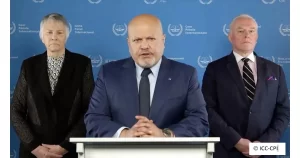Brussels-Rome, 16 March 2021
No Peace Without Justice (NPWJ) had welcomed the establishment of the Committee on the Election of the Prosecutor (CEP) and Panel of Experts as a process that could guarantee greater transparency and ensure that competency rather than vote-trading would guide the selection of the next ICC Prosecutor, including by producing a short list of “most highly qualified candidates”.
By any measure of success, the CEP did not achieve these objectives. This is most starkly evidenced by the fact that three of the four candidates who were ultimately considered by the ASP, all of whom are unquestionably highly qualified, had been inexplicably excluded by the CEP from their shortlist, including the candidate who was eventually elected.
In the first instance, with the support of a Panel of Experts, the CEP narrowed down a list of 89 candidates who completed full applications to a list of fourteen “most highly qualified candidates”. The CEP also reported that all fourteen candidates went through a vetting process, including in respect of “high moral character” and histories of work misconduct, which “did not disclose any disqualifying information”.
In June, the CEP further narrowed down the selection to four candidates, who took part in a Public hearing with questions posed to each candidate on a range of topics by States Parties and civil society. The opacity of this further selection, the rumours and indiscretions on possible reasons why some of the other ten candidates were excluded, and the lack of clarity on the criteria used, has raised legitimate questions on the objectivity and integrity of the entire process. Instead, there were allegations that the CEP deviated from their terms of reference, for example by adding a so-called “new blood” criterion at the urging of some States, or that the four selected candidates were selected so as to pigeonhole States Parties into a single choice, or that one or more of the other ten candidates were excluded due to rumours and innuendos about their sexual orientation or history.
The ensuing controversy led to the re-opening of the short-list to include all long-listed candidates who were willing to continue to participate in the process, all of whom then participated in a second round of public hearings. Instead of putting an end to speculation that one or more of the supposed fourteen candidates were excluded for reasons other than the objective criteria set out in the CEP Terms of Reference, there was an intense period of lobbying and gossip, some of it related to allegations of sexual misconduct against unnamed candidates, which means that even now there is a cloud over all candidates and in particular those who were not on the short list, including the candidates ultimately nominated for election at the ASP.
Our final assessment is that while the process adopted by the ASP was supposed to enhance transparency and reduce politicising the process, it had the opposite result. If anything, the CEP process was ultimately mired in opacity and politics, with an abundant side helping of gossip and innuendo surrounding the “high moral character” requirement. It has to be noted that this gossip was facilitated by a lack of clarity on the part of the selection committee on this issue, including apparently contradictory information being given in the CEP Report and in press or other briefings given by the selection committee.
While the establishment of a proper vetting process, for all elected ICC officials, may help address some of the problems, it may also exacerbate the lack of transparency, the weaponisation of rumours and innuendos, and the allegations of politicking that were witnessed during this process. Great care must be taken to avoid that happening.
NPWJ has two recommendations that we believe can help overcome the shortcomings of this process.
First: Transparency as to who is being considered.
By working behind closed doors on an undisclosed list of candidates, the CEP lacked the main counter-balance to the impression of politicking and backroom dealing, namely transparent oversight of the behaviour of States and other stakeholders, including by civil society. This may have been the result of an apparent confusion about the nature of the process, as it appeared to attempt to be a hybrid between a confidential application process and an open nominations and election process. While the system for election of other ICC officials is not perfect, the transparency in knowing who is under consideration at least avoids the murky situation seen in this last search for the new ICC Prosecutor. All other ICC officials, in particular candidates for Judges and the Registrar, who are being considered for a position are put forward publicly, with transparency as to their qualifications and by whom they are being nominated: there is no reason why the Prosecutor position should be any different. Whatever selection or vetting process is considered, NPWJ therefore recommends that this same level of transparency and openness is adopted for the search for the next ICC Prosecutor.
Second: clarify the mandate and the membership of any future “Search Committee”.
The CEP should have had given either explicitly a political mandate by the ASP, conducted transparently and led by Member States through their representatives (as is the case for focal points and other designated ASP responsibilities), or an expressly technical mandate led and conducted exclusively by non-States experts, preferably those with experience in managing largescale prosecutions of complex crimes, who can then report directly to the Assembly of States Parties as a whole.
In conclusion, we note the recommendations of the Independent Expert Review regarding the election of the Registrar. Presumably drafted prior to the unfolding of events surrounding the election process for the prosecutor, they seem to be essentially suggesting the same process as for the election of the Prosecutor, namely a selection committee comprised of States together with expert support and vetting, resulting in short-list for consideration by the Judges.
It is imperative that the search for the next ICC Registrar does not replicate the same severe shortcomings we saw with the election of the Prosecutor.
- For further information, contact Alison Smith, International Justice Director, on asmith@npwj.org or Nicola Giovannini, Press & Public Affairs Coordinator, on ngiovannini@npwj.org org.




